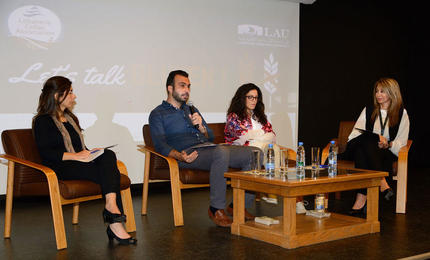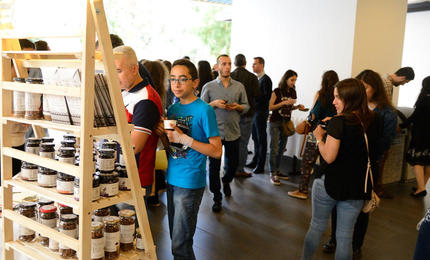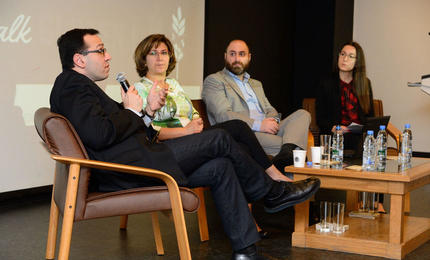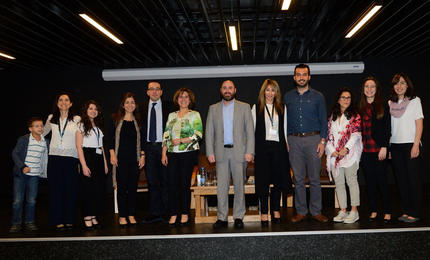“Let’s Talk Gluten!”
The Nutrition Program of the Department of Natural Sciences brings together medical and health experts to raise awareness of celiac disease.

Assistant Professor at LAU and co-organizer of the event event Hassan Hussein addressing the audience in a panel dedicated to “Gluten, Food and Medication.”
Last month, LAU hosted medical experts and health professionals in an awareness and nutrition conference on celiac disease in cooperation with the Lebanese Celiac Association.
Taking place at LAU Beirut’s Wadad Sabbagh Khoury Student Center, “Let’s Talk Gluten!” welcomed medical experts and nutritionists to discuss the difficulties faced by those diagnosed with the genetic autoimmune disease in Lebanon.
“Because Lebanon is so small, people feel it’s taboo to say they have celiac disease,” said Alice Saab, vice president of the Lebanese Celiac Association. “We’re also putting on this conference to show the sufferers from the disease that they’re not alone. We’re in this together, we need to let others know about us, and we need to know that it’s safe for us to eat when we go out,” Saab added.
“Clinical diagnosis of celiac disease can be very challenging,” explained Dr. Rajaa Chatila, associate professor of Gastroenterology at LAU Medical Center-Rizk Hospital and assistant dean for Graduate Medical Education. “Symptoms vary and can appear at different stages of one’s life,” she said, adding that a gluten-free diet should be adapted to the patient. “It is a case by case approach; there is no such thing as a unique diet for all celiacs.”
Those diagnosed with the disease are unable to digest gluten—a protein found in wheat, barley and rye. Following ingestion, common effects include nausea, vomiting, and chronic diarrhea. While research is currently ongoing to find a treatment for the disease, Dr. Fady Daniel, assistant professor of Internal Medicine at the American University of Beirut Medical Center told the audience that a cure was a “long way away.” For the time being, those diagnosed must adhere to a gluten-free diet.
While the physical symptoms of the disease are more familiar to the public, co-panelist Dr. Michel Nawfal, clinical psychologist at Nawfal Clinics, underscored the lesser known, yet critical, correlation of increased mental health issues for celiac sufferers. “Forty-two percent of adults with celiac disease also have mental health problems,” Nawfal told the audience, expressing the crucial need to incorporate mental health into the conversation. Anxiety, he noted, was the most prevalent issue among the younger community.
While gluten-free foods are becoming readily available in the local market, the experts warned against the misuse and abuse of the gluten-free label.
“It’s a billion dollar industry,” Krystel Ouaijan, Senior Dietetics Instructor at Saint Georges Hospital University Medical Center, began, “and there are people who want to follow the diet because it is trendy.” According to Ouaijan, those seeking to exploit the market do not take the medical issue seriously. Such negligence harms celiacs who still manifest symptoms after ingesting food erroneously labeled as “gluten-free.”
Hussein Hassan, assistant professor at LAU’s Natural Sciences Department and co-organizer of the event, added that, according to a recent study he conducted and published in the International Journal of Food Sciences and Nutrition, 19 percent of products labeled as gluten-free that are marketed in Lebanon in fact contained gluten and in 6 percent of these products, the quantity of gluten exceeded the upper limit. He attributed this fraud to the lack of monitoring at the national level.
According to Lena Mansour Haddad, chief pharmacist at LAU Medical Center-Rizk Hospital, another unexpected risk to watch out for is orally ingested medicine. “Unlike the food industry, medicine is not regulated by the FDA,” she said. Despite the lack of labeling in medicine, and unbeknown to users, the drugs contain common traces of gluten from food coloring and fillers.
For 21-year-old Ali el-Jaafari, the biggest challenge of sticking to a gluten-free diet is navigating meals when he leaves the house. “It’s most difficult when I’m out with friends,” he said. “Not every place has gluten-free options.”
Despite the limited awareness of the disease among the Lebanese community, Hassan noted that there was a growing consciousness, and that LAU was a driving force behind that.
“Two years ago, we screened all gluten-free products in Lebanon. This hasn’t been done in the region, so at LAU we are pioneers,” Hassan said. “The celiac disease is a fairly silent issue, and as an academic nutrition program, we are not only increasing awareness but also increasing scientific data.”
If you are celiac, here are some tips to improve your quality of life:
- Scan the ingredients of your food and medications at all times;
- Visit your doctor regularly to monitor your vitamin levels and supplement your nutrients, if needed;
- Continue to exercise as this creates a “halo effect,” which motivates you to heal;
- Check out restaurants and caterers that may customize your menu to fit your condition;
- Join a support group, such as the Lebanese Celiac Association;
- Consult a dietitian to open up your food options.
More
Latest Stories
- SOE Launches its Distinguished Scholar Visiting Program with International Guest Dr. Feras Batarseh
- LAU Nursing Camp Opens Eyes, Hearts and Futures
- Meet Dr. Zeina Khouri-Stevens, Executive Vice President for Health Services
- LAU Family Medicine Graduates to Benefit from a Partnership With Nova Scotia
- AKSOB Assistant Professor Shares Her Vision for the Future of Learning
- LAU Simulation Models Celebrate 20 Years of Learning, Leadership and Service
- The School of Engineering Hosts the Lebanese Electromagnetics Day
- LAU Stands Out on the Sustainability Scores




